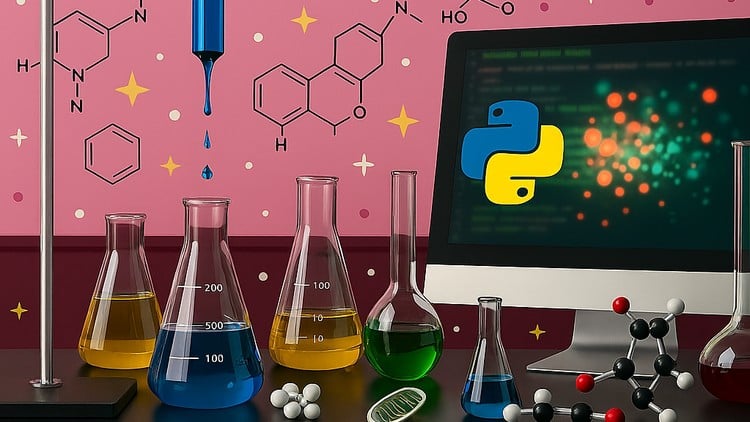
Learn practical Python for chemistry step by step, with 50 solved problems and applications in all branches of chemistry
What you will learn
Gain hands-on experience in applying Python to solve real chemistry problems.
Develop problem-solving strategies by working through 50 practical chemistry problems.
Build confidence to independently apply Python in academic, research, and professional chemistry settings.
Perform calculations of molecular properties, reaction rates, and equilibrium constants.
Solve problems from diverse branches of chemistry (physical, analytical, inorganic, organic, environmental).
Tackle advanced problems with confidence and extend the methods to new challenges.
Add-On Information:
Note➛ Make sure your 𝐔𝐝𝐞𝐦𝐲 cart has only this course you're going to enroll it now, Remove all other courses from the 𝐔𝐝𝐞𝐦𝐲 cart before Enrolling!
- Master Python programming tailored for chemical applications, moving beyond generic coding to context-rich examples.
- Grasp essential data manipulation techniques, including parsing, cleaning, and structuring diverse chemical datasets efficiently.
- Visualize complex chemical phenomena and data trends using Python’s powerful plotting libraries, transforming raw numbers into insightful graphical representations.
- Automate routine or laborious chemical calculations and data processing workflows, significantly boosting your analytical productivity.
- Develop robust scripts for simulating chemical processes, exploring “what-if” scenarios, and predicting outcomes before experimental work.
- Gain proficiency in handling various chemical data formats, from spectroscopic outputs to molecular structures, using appropriate Python libraries.
- Understand the underlying computational logic behind common chemical algorithms, enhancing your ability to critically evaluate and adapt existing tools.
- Build a personalized toolkit of reusable Python functions and classes to streamline future chemical problem-solving efforts.
- Learn to integrate Python with external chemical software or databases, extending its utility for comprehensive research tasks.
- Cultivate an analytical and computational mindset to dissect and resolve multifaceted chemical challenges systematically.
- Explore numerical methods for solving differential equations relevant to reaction kinetics and other time-dependent chemical systems.
- Develop an intuitive understanding of molecular descriptors and their computational derivation, crucial for cheminformatics and QSAR applications.
- Implement statistical analysis routines to interpret experimental data, quantify uncertainties, and draw statistically sound conclusions.
- Design and execute computational experiments, generating data to complement or guide traditional laboratory work.
- Acquire the skills to debug and optimize Python code for chemical applications, ensuring accuracy and computational efficiency.
- Become adept at creating reproducible computational pipelines, fostering transparency and reliability in your scientific endeavors.
- Bridge the gap between theoretical chemical concepts and their practical computational implementation, solidifying your understanding of both.
- Learn to formulate chemical problems into a computational framework, translating scientific questions into solvable algorithms.
- Discover how Python can be leveraged for advanced spectroscopic data processing, from baseline correction to peak fitting.
- Uncover the potential of Python for managing and querying chemical information, facilitating informed decision-making in research.
- PROS:
- High Industry Demand: Python proficiency is a highly sought-after skill in chemical, pharmaceutical, and materials science industries.
- Significant Career Advancement: Elevate your professional profile with a valuable, interdisciplinary skill set that bridges chemistry and computation.
- Empowerment for Research: Gain the ability to tackle complex research questions, automate tasks, and generate insights that traditional methods might miss.
- Leverage Open-Source Ecosystem: Benefit from a vast and continuously growing collection of free, powerful scientific libraries and community support.
- Future-Proof Your Skills: Develop computational competencies that are increasingly essential for innovation and problem-solving in modern chemistry.
- CONS:
- Steep Initial Learning Curve for Absolute Beginners: While structured, combining entirely new programming concepts with complex chemical principles might present an initial challenge for those with no prior coding experience.
English
language